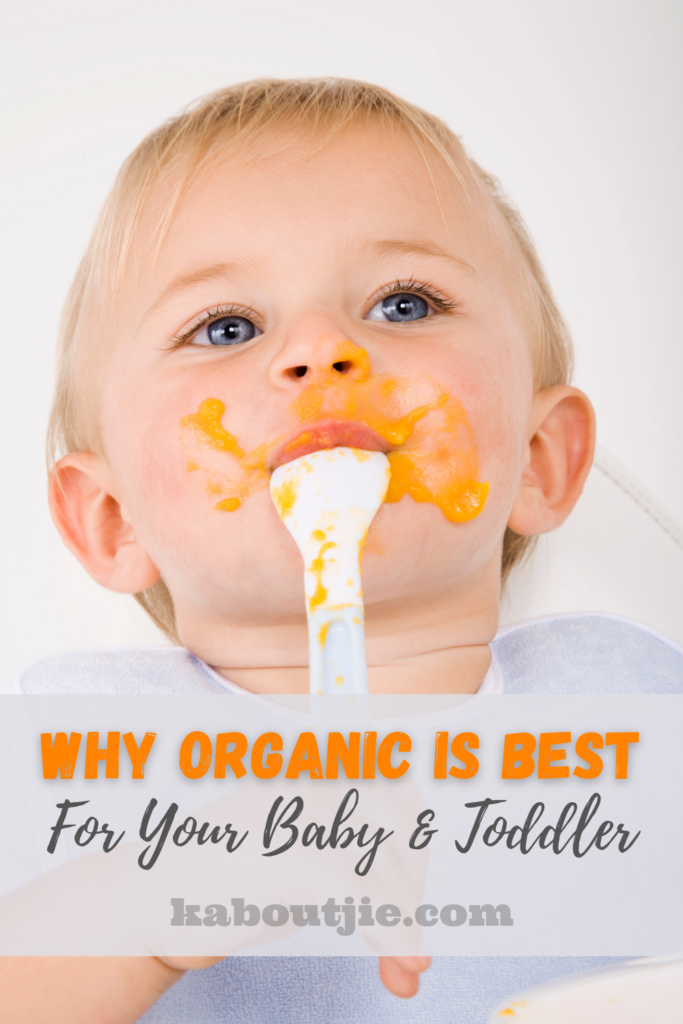In 2019, a study by Healthy Babies Bright Future, an alliance of NGO’s and scientists, found that 95% of conventional baby foods in the US are contaminated with toxic heavy metals including lead, arsenic, mercury and cadmium, which can impact the growth of babies brains, lower IQ, and increase the risk of cancer. It also found that the effects of these toxins are cumulative, and that even low-level exposure in early life was of significant concern.

It’s no coincidence that these poisons are routinely used to produce the chemical fertilizers that are used extensively in conventional farming, and when you add in the toxic pesticides used on these crops, we have a perfect storm which many experts around the world believe is the cause of rising cases of infertility, early puberty in children, cancer, diabetes, obesity, and neurological disorders such as Parkinson’s, ADHD, and autism.
A ground-breaking study published in 1993, “Pesticides in the Diets of Infants and Children”, was the first to focus on the risk of toxic chemicals to this group – prior to this, environmental safety policies had focused on the assessment of risk to the “average adult”.
The study found that infants and children have a heightened susceptibility to chemicals in the environment. Firstly, children have a greater exposure to toxins compared to adults because they drink and eat more than adults in relation to their body weight. In addition, children’s metabolic pathways and their ability to metabolize chemicals are immature and they lack the enzymes needed to break down and remove these poisons.
Thirdly, children’s early developmental processes are complex and easily disrupted. There are critical periods in early development when exposure to even tiny doses of toxic chemicals—levels that would have no adverse effect on an adult—can disrupt organ formation and cause lifelong functional impairments.
Finally, children have more time than adults to develop chronic diseases. Many diseases triggered by toxic chemicals, such as cancer and neurodegenerative diseases, are now understood to evolve through processes that take many years and that are kicked-off by exposures in infancy.
The Bottom Line
With the current chemical-based system of food production, humans are exposed to increasing levels of toxic chemicals which accumulate in our systems throughout our lives. Early exposure – as infants and children – has been linked to the development of a range of cancers and neurological disorders. By limiting this exposure particularly in the vulnerable early years, through feeding infants and children organically produced food, parents can give their children the best possible chance for a healthy future.
 Happy Baby Organic Yogis : Retail Selling price: R88,29
Happy Baby Organic Yogis : Retail Selling price: R88,29
With a burst of strawberry flavor to delight baby’s taste buds, our melt-in-your-mouth freeze dried organic yogurt drops are so good, you may sneak a few yourself!
 Super Smart Pouches: Retail Selling Price: R42,50
Super Smart Pouches: Retail Selling Price: R42,50
Nourish your growing tot with this tasty blend of organic bananas, beets, and strawberries. To help support brain health, each pouch contains 20mg of DHA and 100mg of choline making this pouch perfect for wholesome, on-the-go eating!

Stockists:
Happy Family Organics products are available at Baby City, Babies R Us, Wellness Warehouse, Clicks, Spar, Pick n Pay, Baby Boom, Dis-Chem, Medicare Pharmacies, Takealot, Babies Africa, Faithful To Nature.
Learn more about Happy Family Organics on https://www.happyfamilyorganics.com/ or follow them on social media @happyfamilyorganicssa.
 Kaboutjie SA Mommy Blogs by Lynne Huysamen
Kaboutjie SA Mommy Blogs by Lynne Huysamen





My kids love the happy family organics range. The products are always fresh and taste delicious!
I try my best to incorporate organically produced foods in our daily diet.
This has been a great, helpful read.